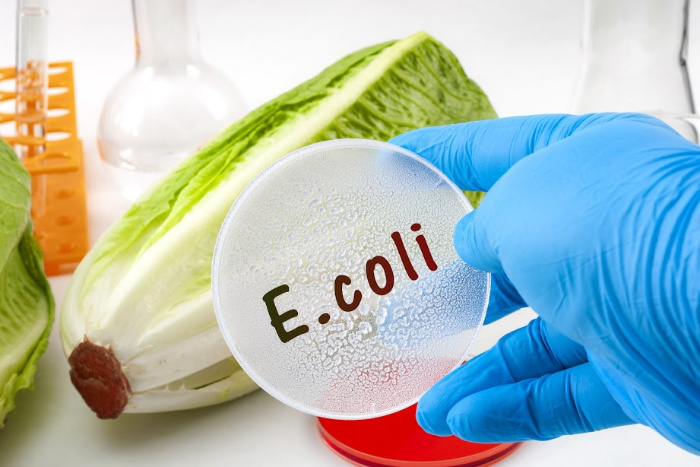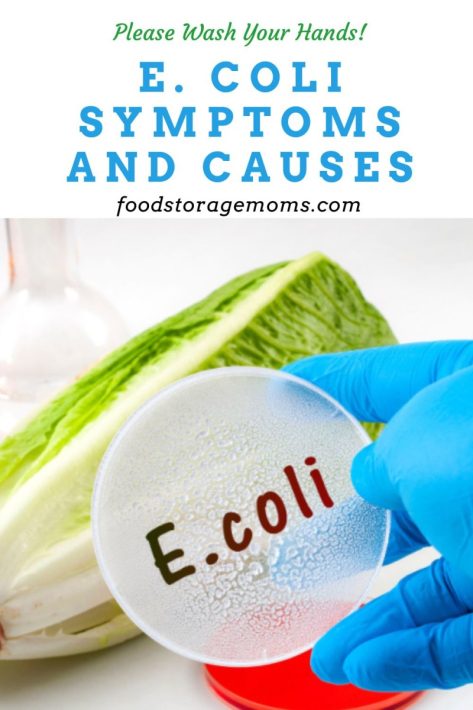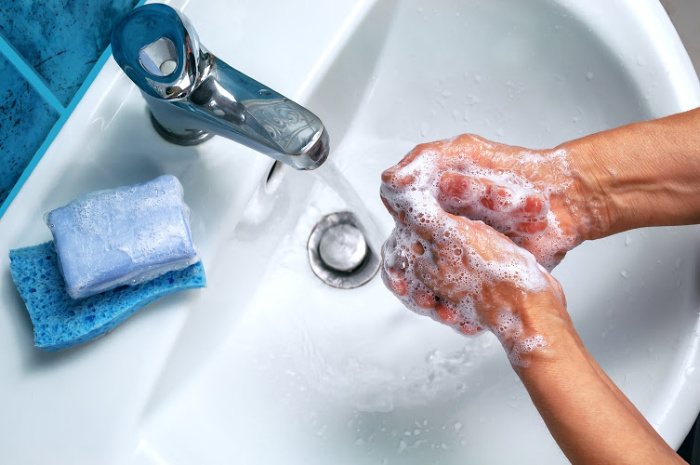
It is estimated that 265,000 people contract E. Coli every year. That means that this is something we need to talk about and know about. With the holidays around the corner, now is a good time to brush up on E. Coli symptoms and causes.
E. Coli is an abbreviation for Escherichia Coli. Escherichia coli are bacteria found in our environment, in foods, and in the intestines of animals and people.
Most strains of E.Coli are harmless. However, others can make you desperately sick. Below, you will learn about E. Coli’s symptoms and causes and how to prevent it.

Romaine E.Coli
I started growing my lettuce indoors using a hydroponics system called AeroGarden. They had a rough year last year and shut down, but I received an email they will reopen in 2025, this year! You can use your seeds as well. AeroGarden Where I buy my garden seeds: SeedsNow
E. Coli Symptoms and Causes
Knowing you have it is the first step in fighting an E. Coli infection. Below, you will learn the symptoms of an E. Coli infection and how you could have contracted the disease. Keep in mind that symptoms and causes can be different for different people.
Symptoms of E. Coli
The symptoms of E.coli can vary for each person. However, there are some classic symptoms that most people will complain about. These symptoms include:
- Diarrhea is usually bloody
- Severe stomach cramps
- Vomiting
- Low fever (101 degrees or less)
Most E. Coli infections clear within 5 to 7 days; however, some infections can get severe or even life-threatening. About 5% to 10% of people who are diagnosed with E. Coli will develop a life-threatening complication called hemolytic uremic syndrome.
What is Hemolytic Uremic Syndrome?
Hemolytic Uremic Syndrome is also known as HUS. HUS usually develops around 7 days after you first notice symptoms. It is a condition that affects the blood and blood vessels, destroying blood platelets, causing a low red blood cell count, and kidney failure.
HUS results when the E. Coli toxins cross from the intestines to the bloodstream and damage your small blood vessels. Symptoms of HUS include:
- Decreased urination
- Feeling very tired
- Losing pink color in cheeks
If you have symptoms of HUS, it is essential to seek emergency care, as your kidneys could shut down.
Causes of E. Coli
There are various causes of E. Coli infection, but it is important to note that contamination originates from nearly invisible feces particles. Exposure to the infection has resulted in the following ways:
- Contaminated Food
- Consumption of raw, unpasteurized milk
- Water that has not been disinfected
- Contact with cattle
- Contact with feces of infected people
In addition, some foods are considered high risk for contracting the E. Coli infection. These foods include:
- Unpasteurized apple cider
- Soft cheeses made from raw milk
- Undercooked meat
People have become infected by eating undercooked hamburgers, swallowing lake water while swimming, touching animals at petting zoos, and not washing their hands well after using the toilet.
How Long Does it Take to Get Sick?
Once you have contracted the E. Coli bacteria, you will usually feel sick within 3 to 4 days. However, the symptoms can start as early as 1 day and last as long as 10 days after the exposure.
When to Contact the Doctor
If you have diarrhea that lasts longer than 3-days, a fever higher than 102 degrees, blood in your stool, or so much vomiting you can’t hold anything down, it is time to contact a healthcare provider.
How are E. Coli Symptoms and Causes Diagnosed?
E. Coli infections are typically diagnosed through laboratory testing of a stool sample. Labs determine if the bacteria is present in your stool. The labs will test for the presence of Shiga Toxins in your stool, which detects E. Coli.
Treatment for E. Coli
Unfortunately, an illness caused by E. Coli can’t be treated. No treatment can cure the infection, relieve symptoms, or prevent complications. Rest and fluids are the best way for most people to fight infection.
In addition to rest and fluids, you will want to avoid taking antidiarrheal medication. This is because the medication slows your digestive system down, preventing your body from getting rid of the infection.
If the infection turns into Hemolytic Uremic Syndrome, you will be hospitalized and given supportive care such as IV fluids, blood transfusions, and kidney dialysis.
Ways to Boost Your Immune System
When you are sick, your immune system is fighting to stay afloat. Whether you have E. Coli or any other sickness, the key to getting and feeling better is boosting your immune system.
Check out my post 18 Simple Ways to Boost Your Immune System and Natural Remedies that Really Work for ways to boost your immune system naturally.
How to Prevent the Spread of E. Coli
E. Coli infections start when you swallow the bacteria. Newborns, children, older adults, those with a weak immune system, and pregnant women are at a greater risk of contracting the infection.
It is found in tiny, usually invisible, particles of human or animal feces. Because you can’t see the bacteria, here are the best ways you can prevent the spread of E. Coli:
Practice Proper Hygiene

Proper hygiene goes hand in hand with good handwashing. If you want to prevent the spread of E. Coli, this is when you should wash your hands:
- Wash your hands after using the bathroom and changing a baby’s diaper.
- Properly wash your hands BEFORE AND AFTER preparing or eating food.
- Thoroughly wash your hands after having contact with animals, including animals in your backyard.
- Wash your hands before preparing a bottle and feeding your infant or toddler food.
- Wash both your infant’s pacifiers and your hands after touching them.
In addition to washing your hands, follow these other proper hygiene tips:
- Keep anything that enters your mouth or another person’s mouth clean. This includes pacifiers and teethers.
- If soap and water aren’t available, use an alcohol-based hand sanitizer. It needs to have at least 60% alcohol in it (Check the label).
- Wash fruits and vegetables under cold running water.
- Cook your meat thoroughly.
- The internal temperature for steaks and roasts should be at least 145 degrees to kill harmful germs.
- Beef and Pork should be cooked to a minimum of 160 degrees.
- Always use a thermometer to check your meat.
- Don’t cross-contaminate food. Please wash your hands, counters, cutting boards, and utensils after they touch raw meat.
- Try not to swallow water at lakes, ponds, or pools.
Final Thoughts
As the holidays approach, this is a perfect time for E.Coli to sneak into our food. Always wash your hands, sanitize your food area, and cook and store food properly. E. Coli is not something you want to get!
Another thing to consider is that diseases such as E. Coli are more prevalent when a disaster happens. This is because of the lack of running water, the inability to store food properly, and the lack of ways to sanitize. The threat of E. Coli is very real, even in a world where we can prevent it. However, we should be prepared for a world where we can’t prevent it. How prepared are you? Start with these 30 Items You Need to Survive a Pandemic.
Don’t forget to pin this E. Coli post to Pinterest so you can find it when you need it! USDA Chart On E.Coli
Have you ever had E. Coli? Please share your story with me in the comments below! May God bless this world, Linda
Copyright Images: E. coli Outbreak Romaine Lettuce AdobeStock_238973581 By Victor Moussa, Soapy Hands In Sink AdobeStock_118533074 By Volodymyr Shevchuk
The post E. Coli Symptoms and Causes appeared first on Food Storage Moms.
from Food Storage Moms
No comments:
Post a Comment